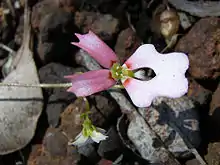Stylidium subg. Centridium
Stylidium subg. Centridium is a subgenus of Stylidium that is characterized by a globose hypanthium, a stipitate brush-like stigma, and gynostemium mobility not produced by a sensitive hinged torosus but by the movement of a cunabulum. All species with the possible and doubtful exception of S. weeliwolli are annuals.[1] This subgenus appears to be most closely related to the genus Levenhookia, which suggests an ancestral relationship.[2] Centridium was first published by John Lindley in the 1839 publication, A Sketch of the Vegetation of the Swan River Colony. Lindley created this subgenus to distinguish species which did not fit into either of the two other subgenera that had existed at the time. He initially placed Stylidium calcaratum, the newly described Stylidium androsaceum, and Stylidium stipitatum into subgenus Centridium. His description of S. androsaceum turned out to be synonymous with S. calcaratum and S. stipitatum is a synonym of Levenhookia stipitata.
| Stylidium subg. Centridium | |
|---|---|
 | |
| Stylidium calcaratum | |
| Scientific classification | |
| Kingdom: | Plantae |
| Clade: | Tracheophytes |
| Clade: | Angiosperms |
| Clade: | Eudicots |
| Clade: | Asterids |
| Order: | Asterales |
| Family: | Stylidiaceae |
| Genus: | Stylidium |
| Subgenus: | Stylidium subg. Centridium Lindl. |
| Species | |
|
Stylidium aceratum | |
See also
References
| Wikisource has original text related to this article: |
- Lowrie, A. and Kenneally, K.F. (1998). Three new triggerplant species in Stylidium subgenus Centridium (Stylidiaceae) from Western Australia. Nuytsia, 12(2): 197-206.
- Carlquist, S. (1969). Studies in Stylidiaceae: New taxa, field observations, evolutionary tendencies. Aliso, 7(1): 13-64.